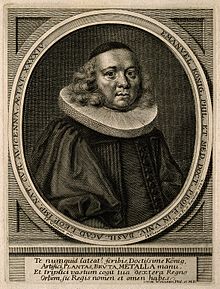Emanuel King
Emanuel König (born November 1, 1658 in Basel ; † July 30, 1731 there ) was a Swiss physicist and doctor. He was a professor of theoretical medicine at the University of Basel . His scientific achievements are assessed ambiguously, and Koenig's works did not find a reception in the medical and scientific world of his time.
Life
Emanuel König was the son of a Basel bookseller and studied medicine and natural sciences in his hometown. In 1677 he received his master's degree in natural science and in 1682 received his doctorate from the medical faculty of the University of Basel. On August 17, 1682, Emanuel König was accepted into the Leopoldina as a member ( matriculation no. 105 ) with the academic surname Avicenna I. After study trips through Italy and France, he returned to Basel and taught ancient Greek as an associate professor from 1695 for the students of the Trivium , and from 1703 physics; from 1706 he was a professor of natural sciences. From 1711 until his death in 1731 he was a professor of theoretical medicine. His successor in this chair was his son Emanuel King II.
plant
Emanuel König's scientific achievements are part of a series of the scientific decline of the medical faculty in Basel since around 1700, which began with the assumption of office by Theodor Zwinger III. (1658–1724) 1703 and Johann Heinrich Staehlin 1711 can be marked. It was not until Daniel Bernoulli became professor of anatomy from 1733 that Basel caught up with the scientific development of the time.
König was a follower of Paracelsus and taught the emerging iatrochemistry , but with a very poor quality. His endeavors were encyclopedic rather than creative. King's Guldener Medicinal Treasure of New Never Discovered Medicines is considered a speculative collection of curiosities, magic substances, incantations and quackery; the work is more related to the medicine of the so-called dirty pharmacy than to the claim of the iatrochemistry of the time. König chose the pseudonym Avicenna among his faculty colleagues , which does not do justice to its minor importance.
In his two works Regnum minerale and Regnum vegetabile et animale (Basel 1682) he differentiated between the three natural kingdoms of pharmacological iatrochemistry (inanimate, mineral nature, plant kingdom and animal kingdom). He summarized this collection again in 1693 in his Κέρας Άμαλτείας Thesaurus remediorum e triplice regno (after the horn of Amalteia, the goat of Zeus ).
literature
- Andreas Elias Büchner : Academiae Sacri Romani Imperii Leopoldino-Carolinae Natvrae Cvriosorvm Historia. Litteris et impensis Ioannis Iustini Gebaueri, Halae Magdebvrgicae 1755, De Collegis, p. 471 digitized
- Wilhelm Hess : King, Emanuel . In: Allgemeine Deutsche Biographie (ADB). Volume 16, Duncker & Humblot, Leipzig 1882, p. 504 f.
- Karin Marti-Weissenbach: King, Emanuel. In: Historical Lexicon of Switzerland .
- Johann Daniel Ferdinand Neigebaur : History of the imperial Leopoldino-Carolinische German academy of natural scientists during the second century of its existence. Friedrich Frommann , Jena 1860, p. 194, Textarchiv - Internet Archive
- Willi Ule : History of the Imperial Leopoldine-Carolinian German Academy of Natural Scientists during the years 1852–1887 . With a look back at the earlier times of its existence. Commissioned by Wilhelm Engelmann in Leipzig, Halle 1889, supplements and additions to Neigebaur's history, p. 149 ( Textarchiv - Internet Archive ).
- King, Emanuel. In: Johann Heinrich Zedler : Large complete universal lexicon of all sciences and arts . Volume 15, Leipzig 1737, column 1235 f.
Web links
- Emanuel König's entry as a member of the German Academy of Sciences Leopoldina , accessed on December 16, 2017.
- Publications by and about Emanuel König in VD 17 .
- History ( memento of February 13, 2012 in the Internet Archive ) of the Medical Faculty Basel
| personal data | |
|---|---|
| SURNAME | King, Emanuel |
| BRIEF DESCRIPTION | Swiss physicist and physician |
| DATE OF BIRTH | November 1, 1658 |
| PLACE OF BIRTH | Basel |
| DATE OF DEATH | July 30, 1731 |
| Place of death | Basel |
